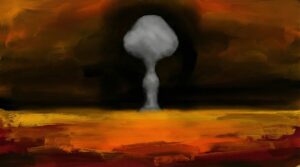
Ep 19 | Simon Michaux
Simon Michaux: “Minerals Blindness”
On this episode, we meet with Associate Professor of Geometallurgy at the Geological Survey of Finland, Simon Michaux.
Why do humans ignore important mineral and material limits that will effect human futures? Michaux reveals how we are “minerals blind” — and the consequences of this myopia.
To shed light on the effects of our minerals blindness, Michaux explores the disconnect between experts in renewable energy and economic and government leaders.
Michaux offers individual strategies for us to overcome our energy and minerals blindness. How can we learn to adapt in order to overcome the coming challenges?
About Simon Michaux
Simon Michaux is an Associate Professor of Geometallurgy at the Geological Survey of Finland. He has a PhD in mining engineering. Dr. Michaux’s long-term work is on the development and transformation toward a circular economy.
In French, we have a motto that says that a simple drawing is often better than a long explanation. Jean-Marc Jancovici Carbone 4 President
That’s very understandable because with left atmosphere thinking, one of the problems is that you see everything as a series of problems that must have solutions. Iain McGilchrist Neuroscientist and Philosopher
We can’t have hundreds and hundreds of real relationships that are healthy because that requires time and effort and full attention and awareness of being in real relationship and conversation with the other human. Nate Hagens Director of ISEOF
This is the crux of the whole problem. Individual parts of nature are more valuable than the biocomplexity of nature. Thomas Crowther Founder Restor
Show Notes & Links to Learn More
Download transcript00:45 – Simon Michaux info + works
01:10 – Energy Blind
02:58 – Mintech
03:11 – Geometallurgy
08:10 – Fossil energies are finite
08:15 – Mineral resources are finite
09:30 – Volcanic reproduction of minerals
10:25 – The fourth industrial revolution
14:20 – Coking coal
15:08 – Low carbon steel
15:59 – Scalability
17:11 – It takes decades to build a grid of new plants
19:40 – 19 terawatt powered society
20:44 – In general we’re adding 1-2 nuclear power plants per year
22:19 – Nuclear cannot scale up fast enough to replace fossil fuels
22:51 – Base metals are recycled at 30-60% and technology metals don’t get recycled at all
24:09 – Circular economy
25:20 – Resource balanced economy
26:42 – Quantitative easing
29:26 – Availability of uranium and thorium
30:50 – Energy properties
32:22 – Cobb Douglas Function
32:50 – Generation IV nuclear power
35:15 – 2018 Peak Oil
38:10 – Extracting copper will become more difficult
40:28 – Renewables: Right answer to the wrong question
32:35 – Minerals in a wind turbine (2-ton neodymium magnet)
43:28 – ⅓ of current system will be electrified according to the European commission
43:43 – There’s not enough time or materials to mine and replace lithium to meet goals by 2030
46:07 – Brandenburg, Germany 100% renewable by 2030
52:03 – Manufacturing and raw material production in Russia and China
52:38 – Natural gas in Europe comes from Russia
53:50 – Liquifying and unliquifying gas loses 30% of energy properties
58:04 – Peak coal 2013 and peak gas 2019
1:03:10 – Paul Ehrlich info + TGS Episode
1:03:20 – Industrial fertilizer
1:03:40 – We’ve lost 40% of arable land since 1960
1:05:45 – Cuban response to oil embargo






